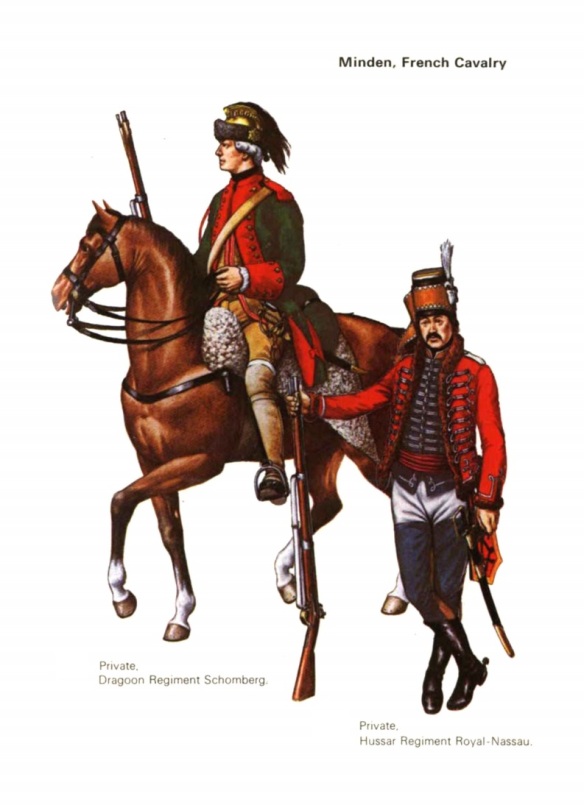By the Seven Years’ War the French army was no longer the major force it had been half a century earlier. Even fifteen years earlier during the War of the Austrian Succession the French army had achieved great feats of arms (primarily under de Saxe). Although the army itself was not of the highest calibre the primary reason for its poor performance seems to have more to do with no clear idea of what the war was about or what the main objectives were, court intrigue and a series of truly woeful commanders. When well led the French army was still capable of a creditable performance.
While it has no outstanding attributes this army does have a good proportion of all the troop types and has no major weaknesses.
In America the French government relied primarily on local forces backed up by colonial troops (Compagnes Franche de la Marine). Due to government apathy and British domination in the Atlantic only very limited numbers of regular French troops were sent to America. In spite of this the French in Canada staged a long and determined campaign against the British colonists. For much of the war the British were actually on the defensive. The Canadian militia could be of considerable use as they could fight effectively in bad terrain.
Interestingly the French army was one of the great innovators of the Seven Years’ War at the tactical and strategic level. Skirmishing line infantry companies, attack columns and a true corps level organisation were amongst the French army’s new developments.
Étienne François, duc de Choiseul
Étienne-François, comte de Stainville, duc de Choiseul (28 June 1719 – 8 May 1785) was a French military officer, diplomat and statesman. Between 1758 and 1761, and 1766 and 1770, he was Foreign Minister of France and had a strong influence on France’s global strategy throughout the period. He is closely associated with France’s defeat in the Seven Years War and subsequent efforts to rebuild French prestige.
Seven Years War
His diplomatic success in Vienna opened the way to a larger career, when, in 1758, he supplanted Cardinal de Bernis as minister for foreign affairs, and so largely had the direction of French foreign and military policy during the Seven Years’ War. In 1759, he planned an ambitious invasion of Britain which was halted by French naval defeats at the Battle of Lagos and the Battle of Quiberon Bay. His other major plan to achieve victory in 1759 was an attack on Hanover, which was thwarted by the French defeat at the Battle of Minden. Between 1759 and 1762, further French moves into Germany were unsuccessful – including the Battle of Vellinghausen.
At this time, he was made a peer of France and created duc de Choiseul. Although, from 1761 until 1766, his cousin César Gabriel de Choiseul, duc de Praslin, was minister for foreign affairs, Choiseul continued to control the policy of France until 1770, and during this period held most of the other important offices of State. As author of the Pacte de Famille, he sought to retrieve by an alliance with the Spanish House of Bourbon the disastrous results of the alliance with Austria, but his action came too late. His vigorous policy in other departments of state was not, however, fruitless.
Coming to power in the midst of the demoralization consequent upon the defeats of Rossbach and Krefeld, by boldness and energy he reformed and strengthened both army and navy, and, although too late to prevent the loss of Canada and India, he developed French colonies in the Antilles and San Domingo.
In the years following the Treaty of Paris of 1763, Choiseul attempted to rebuild the French military. Alarmed by the British victory in the Seven Years War and the apparent hegemony that followed, he tried to secure continued Spanish support for a future war of revenge against Britain. In aid of this, he drew up a number of plans for an invasion of Britain. In an effort to compensate for French territorial losses, he added Corsica and Lorraine to the crown of France. He directed the French Conquest of Corsica. He also oversaw a failed scheme to settle Guiana. By the late 1760s Choiseul was concerned by the growing strength of Russia around the Baltic Sea fearing that Britain was behind it. He believed they were planning a “northern league” against France. To counter this he hoped to depose or severely weaken the power of Catherine the Great by encouraging the Ottoman Empire to attack Russia.
